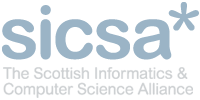by Vasileios Stamatis
29th July 2019
 The European Summer School in Information Retrieval (ESSIR) is a summer school for Information Retrieval and has been taking place since 1990 and the last few years it has taken by every two years. The ESSIR 2019 took place in Milan, Italy, in the University of Milan-Bicocca. Myself and many other students from all over the world attended this summer school. For attending this summer school I was funded by SICSA. I wouldn’t be able to attend if SICSA hadn’t funded me for this summer school.
The European Summer School in Information Retrieval (ESSIR) is a summer school for Information Retrieval and has been taking place since 1990 and the last few years it has taken by every two years. The ESSIR 2019 took place in Milan, Italy, in the University of Milan-Bicocca. Myself and many other students from all over the world attended this summer school. For attending this summer school I was funded by SICSA. I wouldn’t be able to attend if SICSA hadn’t funded me for this summer school.
The summer school organised by the Information Retrieval Laboratory (IR Lab) at the University of Milan Bicocca and the Information Management Systems (IMS) research group at the University of Padua. The main focus was Information Retrieval (IR) courses and related research topics.
The first day started with some interesting courses about Information Retrieval as interaction in general, what it is and some main concepts such us offline vs online vs user-study evaluation etc. Then we learned about approaches in research. It was great to learn how to succeed in the PhD journey, how to choose a research area and how to approach research in general. The last 2 courses were about evaluation, we learned how important evaluation for IR and Research is in general and we also learned tasks and existing work in the evaluation field.
The second day started with user oriented IR and its foundations. We learned all these different IR models and the most significant contributions to the field. Also, we learned about experiments and how to approach an experiment and what factors are important during an experiment. Finally, machine learning and its approaches to IR were discussed, learning to Rank and Neural nets were the hot topics; and future research directions on the field.
The following day in the morning, the courses were about scalability in IR in which we learned about indexes and the importance of scalability in efficiency in web search engines. Then we learned about social media and how they are used to gather data and convert data to real knowledge. In the afternoon the Future Directions in Information Access (FDIA) presentations took place. It was great to hear presentations from colleagues and learn about their work, and have discussions afterwards.
Thursday started with medical IR and then recommender systems and after that we had a discussion about the summer school in general….what we liked and did not like and what should be included in the next summer schools. Then we discussed about IR in general, core skills, background, and internships in order to succeed. In the afternoon we had the FDIA poster session and I had the opportunity to present a poster. It was very helpful discussing, explaining and exchanging ideas about our work with other students and researchers as well. It is extremely helpful to make new connections by discussing our work. I met many people and I also learned about future events that I wouldn’t know otherwise.
The last day there were two courses, one of which was about task based IR systems. We learned about modelling search behaviours, inferring intents, how to evaluate such systems etc. The last course was on Biases on search and recommender systems in which we discussed different forms of biases. #ESSIR2019 in the University of Milan–Bicocca was an exciting experience. I really enjoyed my time in the summer school. I met many students and we shared ideas and challenges about our work. Now, we have been equipped with new skills and experiences in order to continue our research journey. This wouldn’t have been possible without SICSA. Thank you SICSA for this!











 Recently, some students may have attended the CyberFirst events held across universities – Edinburgh Napier University and University of Glasgow. These courses are organised by the National Cyber Security Centre and aimed at encouraging 11 – 17 year olds to the world of cyber security. It is worth noting that CyberFirst is a Student Bursary scheme which is available to first year students at university too – details are available and applications are usually open in April each year.
Recently, some students may have attended the CyberFirst events held across universities – Edinburgh Napier University and University of Glasgow. These courses are organised by the National Cyber Security Centre and aimed at encouraging 11 – 17 year olds to the world of cyber security. It is worth noting that CyberFirst is a Student Bursary scheme which is available to first year students at university too – details are available and applications are usually open in April each year. 

